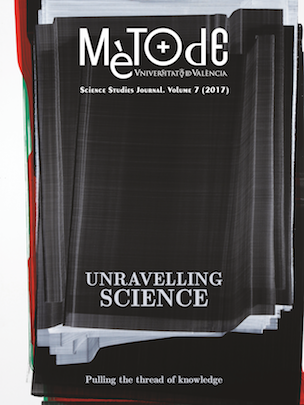Crazy about science: The difficulty of mixing accountability and caregiving
DOI:
https://doi.org/10.7203/metode.7.8080Keywords:
accountability, scientific production, gender equality, care, inequality Abstract
Abstract
The general model for evaluating scientific production fits into the accountability system: a way of measuring scientific output which does not usually acknowledge the presence of gender imbalances in academic institutions. Here we take the need to rethink this system and the indicators it uses to measure productivity and scientific quality, as well as the social conditions in which these activities are measured, as a starting point. In particular, we urge the review of this system, considering the administration of caregiving to dependents, be they young or old, as an example, because it is an unresolved problem that affects scientific work as well as progress in gender equality in university institutions.
 Downloads
Downloads
 References
References
Bailyn, L. (2003). Academic careers and gender equity: Lessons learned from MIT. Gender, Work and Organization, 10(2), 137–153. doi: 10.1111/1468-0432.00008
Bok, D. (2010). Universidades a la venta. La comercialización de la educación superior. Valencia: Publicacions de la Universitat de València.
Boni, A., Peris, J., Acebillo, M., McGee, R. M., Calabuig, C., & Hueso, A. (2012). Los discursos sobre “accountability” en el sistema de cooperación al desarrollo español. Revista Española de Desarrollo y Cooperación, 29, 199–212.
Bourdieu, P. (2008). Homo academicus. (P. Collier, Trans.). Madrid: Siglo XXI. (Original work published in 1984).
Burrows, R. (2012). Living with the h-index? Metric assemblages in the contemporary academy. The Sociological Review, 60(2), 355–372. doi: 10.1111/j.1467-954X.2012.02077.x
Carrasco, C. (Coord.). (2007). Estadístiques sota sospita: Proposta de nous indicadors des de l’experiència femenina. Barcelona: Institut Català de les Dones.
European Association for Quality Assurance in Higher Education. (2015). Estàndards i directrius per a l’assegurament de la qualitat en l’Espai Europeu d’Educació Superior (Agència per a la Qualitat del Sistema Universitari de Catalunya [AQU]). Barcelona: AQU. (Original work published in 2005). Retrieved from http://www.enqa.eu/indirme/esg/ESG%20in%20Catalan_by%20AQU%20Catalunya.pdf
European Commission. (2016). She figures 2015. Gender in research and innovation. Luxembourg: Publications Office of the European Union. doi: 10.2777/744106
Gill, R. (2010). Breaking the silence: The hidden injuries of the neoliberal academia. In R. Ryan-Flood, & R. Gill (Eds.), Secrecy and silence in the research process: Feminist reflections (pp. 228–244). London: Routledge.
Hernàndez, F. J., & Villar, A. (2014). La millor pedagogia és la igualtat. Revista Futura, 28, 40–42.
Herzog, B., Pecourt, J., & Hernàndez, F. J. (2015). La dialéctica de la excelencia académica: De la evaluación a la medición de la actividad científica. Arxius de Ciències Socials, 32, 69–82.
Izquierdo, M. J. (2008). I Congreso Internacional Sesgo de género y desigualdades en la evaluación de la calidad académica. Foros y talleres de trabajo. Bellaterra: Observatori per a la Igualtat; Universitat Autònoma de Barcelona.
National Statistics Institute. (2011). Encuesta de empleo del tiempo 2009-2010. Madrid: INE. Retrieved from http://www.ine.es/dyngs/INEbase/es/operacion.htm?c=Estadistica_C&cid=1254736176815&menu=resultados&idp=1254735976608
Obiol, S. (2014). La transformación de la familia: El caso de los trabajadores del sector textil-confección valenciano. Revista Española de Investigaciones Sociológicas, 145, 127–146. doi: 10.5477/cis/reis.145.127
Pastor, I., Belzunegui, À., Moreno, B., & Mañas, C. (2010). La igualtat d’oportunitats a la universitat: Les percepcions del PDI. Papers: Revista de Sociologia, 95(2), 457–481. doi: 10.5565/rev/papers/v95n2.19
Santos, J. A., Muñoz, D., & Poveda, M. M. (2015). En cuerpo y alma: Intensificación y precariedad en las condiciones de trabajo del profesorado universitario. Arxius de Ciències Socials, 32, 13–44.
Sennett, R. (2000). La corrosión del carácter: Las consecuencias personales del trabajo en el nuevo capitalismo. Barcelona: Anagrama.
Slaughter, S., & Leslie, L. L. (1997). Academic capitalism: Politics, policies and the entrepreneurial university. Baltimore (Maryland): The Johns Hopkins University Press.
Slaughter, S., & Rhoades, G. (2004). Academic capitalism in the new economy. Baltimore (Maryland): The Johns Hopkins University Press.
Downloads
Additional Files
Published
How to Cite
-
Abstract1006
-
PDF308
-
(Español)2
Issue
Section
License
![]()
All the documents in the OJS platform are open access and property of their respective authors.
Authors publishing in the journal agree to the following terms:
- Authors keep the rights and guarantee Metode Science Studies Journal the right to be the first publication of the document, licensed under a Creative Commons Attribution-NonCommercial-NoDerivatives 4.0 International License that allows others to share the work with an acknowledgement of authorship and publication in the journal.
- Authors are allowed and encouraged to spread their work through electronic means using personal or institutional websites (institutional open archives, personal websites or professional and academic networks profiles) once the text has been published.





